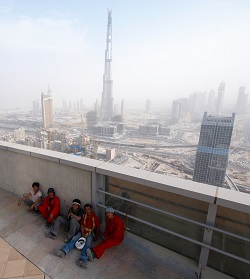On 31 August 2014, Krishna Upadhyaya and Ghimire Gundev disappeared from Doha, Qatar, just before they were supposed to board their plane to leave the country. The pair of human rights defenders were in the country researching the plight of migrant workers in the Gulf emirate.
Shortly before their disappearance, the researchers communicated to their employer that they were being followed by Qatari security personnel and that they might be detained. When they failed to board their plane, their employer repeatedly tried to contact the Qatari officials for information on the activists, but did not receive any response. Various human rights organizations also called for information on the whereabouts of the activists, but the activists remained effectively disappeared.
On Saturday, 6 September, almost one week after their last communication, Qatar’s Foreign Ministry acknowledged that the Qatari government arrested and interrogated the men for having violated the provisions of the laws of the state of Qatar. The government provided no specific information on where it was holding the men, and did not release any information on the particular charges under which it detained them. On 9 September, the government released the researchers without further providing any reasons for their arrest. They are now waiting to leave the country.
Qatar has recently found itself under significant scrutiny for the treatment of migrant workers in the construction of stadiums for the 2022 World Cup. Reports of horrific working conditions, deprivation of wages, despicable accommodations, physical abuse, and disappearances and even unexplained deaths of migrant workers have brought to light the pervasive exploitation of migrant workers in Qatar and the accompanying lack of acceptable legislation commissioned by the government to counter the phenomenon.
There are over 1.4 million migrant workers in Qatar, representing nearly 94% percent of the overall population. Qatar, however, practices a regressive, archaic system of recruitment called the kafala system, by which many migrant laborers often find themselves tied to abusive employers with no ability to escape. Such contracts do not give the workers any rights in terms of determining their wages, their hours and conditions of work, their accommodation and living conditions, or their right to leave their employer, and many employers often appropriate the passports of their employees so as to effectively strand them in the country.
The enforced disappearance and subsequent arbitrary detention of the two human rights researchers highlights the risk to other human rights defenders in the country, and begs the question of whether these researchers would have been released in the absence of the uproar caused by the international NGO community. It also invokes reflection that, if well-known and duly represented human rights defenders can go missing, then how safe are the large number of often undocumented migrant workers in the country?
###
Sonia Pereira is a legal intern at ADHRB.





